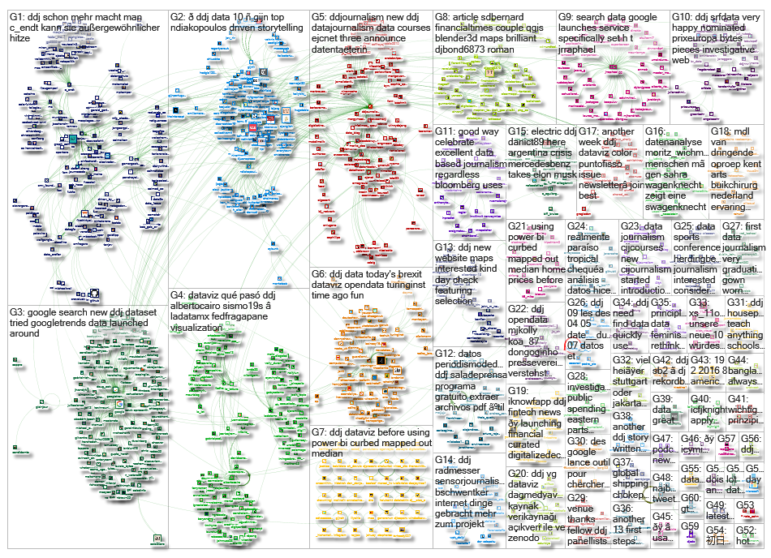What’s the global data journalism community tweeting about this week? Our NodeXL #ddj mapping from September 3 to 9 finds @FiveThirtyEight attacked by the green-eyed monster with their equivalent of Bloomberg’s “Jealousy List,” @daswasfehlt breaks down Austria’s arms exports, @GoogleAI announces the beta launch of Google Datasets Search, and @SZ documents how climate change is wreaking havoc on temperatures in Germany (while boosting ice-cream sales).
Damn, Wish We’d Done That
FiveThirtyEight is so jealous of Bloomberg’s year-end “Jealousy List” that they’ve come up with their own monthly feature — “Damn, We Wish We’d Done These 5 Stories This Month.” Great for discovering excellent stories to be envious of and aspire to do better.
A+ What a good way to celebrate excellent data-based journalism, regardless of who does it. Bloomberg also uses this format. Also escapes the not-invented-here syndrome at #NYT and elsewhere. “Damn, We Wish We’d Done These 5 Stories This Month” https://t.co/PhA32rUwNb #ddj
— Edward Tufte (@EdwardTufte) September 3, 2018
How Austria Arms the World
Austria’s weapon manufactuers exported arms, ammunition, vehicles and more to 164 countries between 2004 and 2016. Glock pistols for the FBI, vehicles to Algeria, tanks to Kuwait — Addendum breaks down where Austrian companies supply weapons. (In German)
Wohin dieses Geld geflossen ist, sehen Sie hier: https://t.co/WsDJ4yxFNe pic.twitter.com/dyWyNIOSd8
— Addendum (@daswasfehlt) September 6, 2018
Discover Datasets on Google
Google’s Dataset Search (beta), launched last week, continues to generate buzz. Similar to how Google Scholar works, Dataset Search lets you find datasets wherever they’re hosted, whether it’s a publisher’s site, a digital library or an author’s personal web page. Dataset providers have to follow some guidelines to allow Dataset Search to index their data and make it discoverable.
Google just launched Open Dataset search!
As a heavy user of Google Scholar, I applaud their efforts to make the world's open data more accessible for researchers and data scientists.
And they've already pulled in some @freecodecamp datasets via @kaggle. https://t.co/2I2cwhgZKd pic.twitter.com/ojysx64VCR
— Quincy Larson (@ossia) September 10, 2018
Hot in Germany
The 2018 season was so hot and dry that it begs the question: is this just normal weather or climate change? Suddeutsche Zeitung starts their piece strong with striking images showing missing lakes, forests and crops due to the hot weather, then maps the difference in this year’s summer temperatures compared to historical temperatures and peppers in anecdotes of people affected by the heat, including an ice-cream seller enjoying brisk sales. (In German)
Das lohnt sich, optisch und inhaltlich: Ein hübsches Datenprojekt zum Sommer 2018 (cc @HannahBeitzer @ChristophvonEi @MSchories @Jaschensky @munichrocker @SperberS und Kollegen)https://t.co/Vd3lPEOv5K pic.twitter.com/sPIo8pceO1
— Saskia Aleythe (@saskiaaleythe) September 6, 2018
Quebec’s Rising University Fees
Radio-Canada obtained financial databases from all Quebec universities, with information on incomes and expenditures over the past 20 years. They analyzed the data to pinpoint the reasons for the rise in university fees. (In French)
Super dossier statistique sur l'explosion des frais afférents dans les universités québécoises depuis vingt ans et la baisse du service https://t.co/yYDF7ELFxU
— Guillaume Piedboeuf (@GPiedboeuf) September 4, 2018
Kidney Disease Epidemic in El Salvador
Renal failure is one of the main causes of hospital deaths in El Salvador. ElSalvador.com discusses the stigma surrounding kidney disease and dialysis, which has led to a fear of being diagnosed with kidney disease and reluctance to get treated. (In Spanish)
[ #FocusDATA ]
Jiquilisco, uno de los lugares más golpeados por la epidemia renal, cuenta a sus muertos y pierde a sus jóvenes por una enfermedad que se fortalece 👉 https://t.co/Gg0dhnEzA1 #ElSalvador pic.twitter.com/G6epb4lWlY
— elsalvador.com (@elsalvadorcom) September 5, 2018
Cairo on Dataviz
University of Miami professor Alberto Cairo teaches his students that, in order to understand visualization well, they need to be able to explain it to others. Here he features six pieces from his students.
To learn visualization, write about visualization https://t.co/TsnmTQyp5R #dataviz #infographics #ddj pic.twitter.com/fFlJwyAFbB
— Alberto Cairo (@albertocairo) September 3, 2018
Cairo on Interrogating Data
“If you know how to analyze, interrogate and interview data you will get stories, but if you do not have that capacity, the data will deceive you,” Alberto Cairo told Susana Pérez-Soler in a recent interview about the need for journalists to understand cognitive biases, and the data visualization project he is developing with Google News Lab. (In Spanish)
"Abrir una plantilla de Excel y crear una barra de gráficos, analizar y visualizar números es algo que todo periodista debería saber hacer porque aumenta sus habilidades para contar historias", @albertocairo. Recomendable entrevista de @susanaprezsoler https://t.co/ooQu8lV7Pa
— José Luis Rojas (@rojastorrijos) September 5, 2018
Extracting Data from PDFs
Tabula is a free tool for extracting data from PDF files into CSV and Excel files. Consejo de Redacción prepared a short tutorial on how to use Tabula to extract the data you need. (In Spanish)
Un programa gratuito para extraer datos de archivos pdf https://t.co/YGAxyp2BL6 #útil #periodismodedatos #ddj pic.twitter.com/w9nyFnvtOL
— Gerardo Albarrán de Alba (@saladeprensa) September 3, 2018
#InfoVis2018 Summit
Catch Juan Velasco from 5W Infographic among those (Erika Espinosa of Deftly Creative, Lazaro Gamio from Axios, Angel García from Nuestro Diario, Antonio Farach from the Times of Oman, and Lauren Tierney from The Washington Post) at the second Infovis International Summit of Visual Communication in Mexico City on November 8 and 9.
In our blog today: @INFOVIS_ conference and workshops in Mexico Cityhttps://t.co/LB8ZoLdHpD#infographics, #dataviz, #ddj pic.twitter.com/8Hg8h62Tr2
— Juan Velasco (@juanvelasco) September 7, 2018
Thanks, once again, to Marc Smith of Connected Action for gathering the links and graphing them.
 Eunice Au is GIJN’s program coordinator. Previously, she was a Malaysia correspondent for Singapore’s The Straits Times, and a journalist at the New Straits Times. She has also written for The Sun, Malaysian Today and Madam Chair.
Eunice Au is GIJN’s program coordinator. Previously, she was a Malaysia correspondent for Singapore’s The Straits Times, and a journalist at the New Straits Times. She has also written for The Sun, Malaysian Today and Madam Chair.

